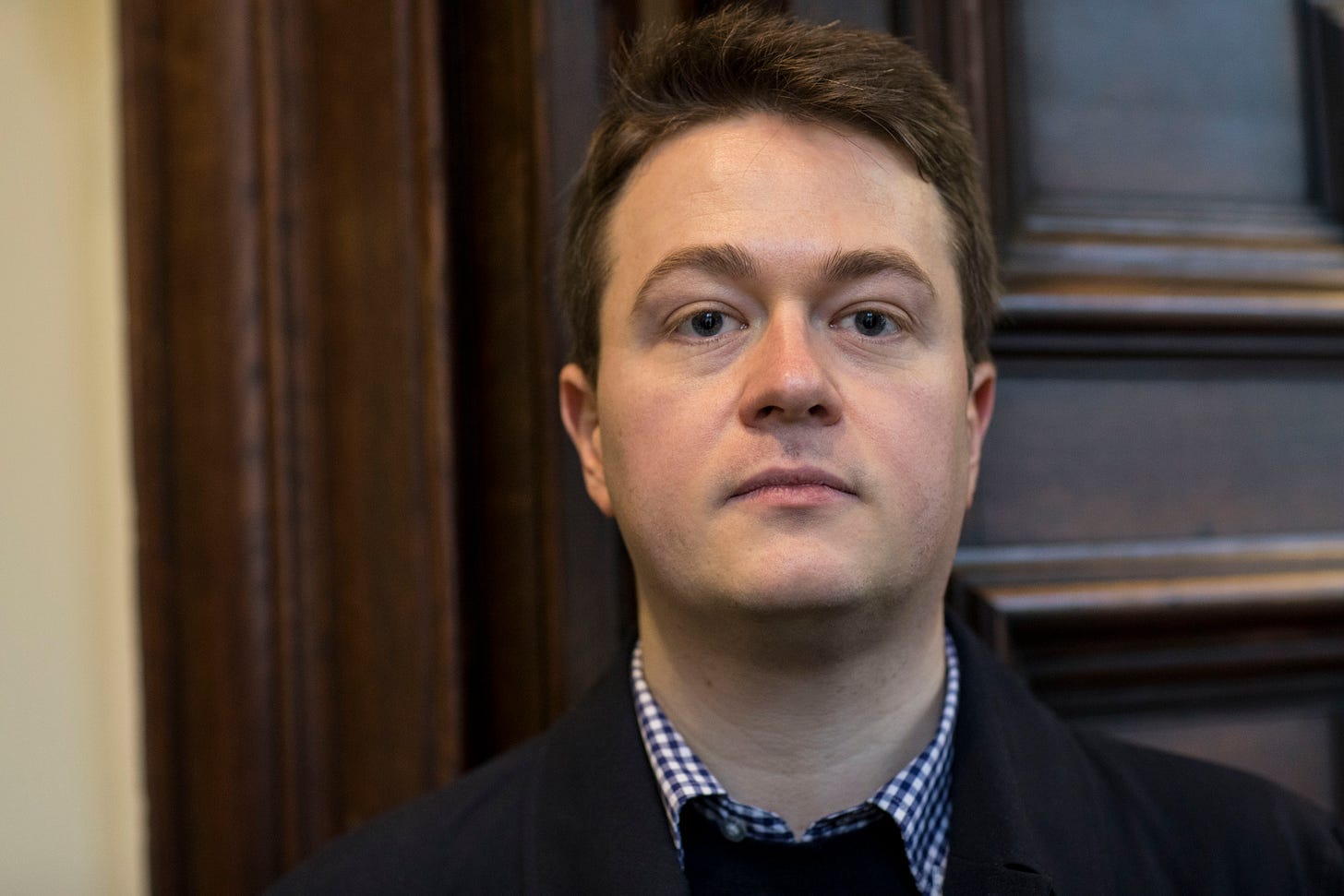Three Dubious Claims About Social Media
Doom-mongers are unable to prove many of their key assertions.
If you’re looking for a convenient scapegoat to take the blame for something bad that is happening, you can’t go wrong with social media. It’s a new phenomenon, sprawling in scope, and it touches the lives of almost everyone in the developed world. It’s also difficult to study in any sort of rigorous way. So whether you’re trying to explain war, politics, or the human condition, you can rest assured that there’s a catch-all explanation that you can Like & Subscribe to.
The problem is that many of the claims underlying the panic about social media rely upon dubious assumptions. The conclusions of empirical research are often far more limited than many people like to pretend. To help you out, here are three common claims about social media, and why we should treat them with a little more skepticism before smashing the retweet button.
“Social media is responsible for the rise of fake news”

Since the shock of the 2016 election, “fake news” has been a go-to for explaining what felt like the inexplicable. It has been a constant focus of dire warnings about the ills of social media, from the Director-General of the WHO’s bold claim that “we’re fighting an infodemic,” to Barack Obama’s warnings about social media’s impact on democracy.
But is social media causing an avalanche of fake news? Dr Martin Moore, who researches political economy at King’s College London (KCL) argues that we should be careful to put claims about misinformation into perspective.
“We made this shift from the era of information scarcity to an era of information abundance,” says Moore. “We have far, far more information published and consumed and available. Therefore, if you look at any of these things in absolute terms, it's not surprising that you're going to see more of everything!”
Moore argues that “fake news” is a messy concept, and is better understood as several separate phenomena. For example, state-directed disinformation is different in scale and intent than click-farms that produce junk content to make money from advertising, and that is different again from legitimate reporting that is presented in hyperpartisan or sensational terms to boost engagement.
“It’s not particularly helpful,” says Moore. “It seems to me we try to shove it all in the bucket that says ‘fake news’ and say we have this problem that we have never had before.”
So simply worrying about the scale of the problem isn’t particularly useful in and of itself. Perhaps, though, social media-driven disinformation is impacting our politics?
Moore points to research by Matthew Gentzkow and Hunt Allcott, who attempted to measure the impact of fake news stories during the 2016 election. They calculate that a likely ballpark for the impact of the most viral fake news on vote shares is “on the order of hundredths of a percentage.” They stress that there are many factors that could influence this figure. But it is implausible that any would be large enough to radically shift the percentage upward into election-altering territory. The authors calculate that most voters probably read at least a few fake stories during the campaign—but the impact was minimal compared to the rest of the election noise.
And while Gentzkow and Allcott examined specific fake stories, much of the other research on this topic is not so rigorous, and should carry a health warning.
“The difficulty is the methodology,” says Moore. “The way in which most people seem to calculate exposure to fake news is by creating a laundry list of so-called fake news websites, normally gathered from various different fact-checking organizations (Politifact, and FullFact, and others) and then saying that is all fake, and everything else is real. The problem with that is it talks about publishers, and it doesn’t talk about content.”
He gives the example of how RT, the Russian state-owned news outlet, will publish untrue stories, or stories skewed towards Russia’s perspective, but it will intermingle content with other reporting that might actually be true.
So can we say anything for sure about fake news and social media?
Two recent studies have shown that some fake news travels further on social media than true news. But, as The Atlantic pointed out, the studies only measured “a very small subset of fake-news stories on Twitter,” namely, “Those that had been deemed worthy of a formal fact-check.” It is therefore misleading to claim, as much of the subsequent reporting did, that in total “false information on [Twitter] travels six times faster than the truth.” All the studies really showed was that the most viral fake news spread further, on average, than the most viral true news.
In short, misinformation has always been around, and its recent proliferation is in a large part the result of an upsurge of information in general. The label “fake news” is an unhelpful catch-all for a diverse array of phenomena. And while the most viral fake news is, well, viral, it has not been proven that lies are more infectious than truth in toto.
“Social media has done damage to mental health”
Mental health is another area where social media platforms have been in the firing line. As Upworthy recently put it: “It’s getting harder to deny the damage that social media is doing to teenage girls.”
Though numerous studies have shown that Gen Z’s mental health is deteriorating, what drives the phenomenon is still an open question. Can we really draw a causal link between social media and mental health?
“The short answer is there isn’t enough evidence,” says Dr Kasia Kostyrka-Allchorne, a researcher in Experimental Psychopathology at KCL. “Although there is a lot of research, it's not of very great quality.”
She thinks the problem is that the existing body of research tends to have identified correlation, and that causal claims are shakier. “They take a measure of, say, social media use, and they take a measure of mental health in a given time, but that doesn't really tell us a lot,” she says.
Last year Kostyrka-Allchorne and her colleagues published the results of their own pilot study that looked specifically at social media and mental health by conducting focus groups with young people with experiences of self-harm, eating disorders and ADHD. They concluded that the reality of the relationship is more complicated.
“What they did flag up was that a lot of problems stem from what happens in people's offline lives,” she says. “A lot of vulnerabilities and risks happened in their offline environment and they may be exacerbated by what happens online.”
And as with the question of fake news, the existing research has its own methodological limitations.
“You can spend an hour on Facebook, or Twitter, looking at the very positive content, engaging in a very positive way that helps mental health, [such as] supportive communities and so on,” she explains. “At the same time, you can spend an hour looking at the content that, for example, triggers self harm, or provides new methods or concealment of self harm.”
And this complexity makes it hard to measure.
“A lot of studies just take a snapshot of screen time, and that is a very blunt instrument,” says Kostyrka-Allchorne. “It doesn't tell us much. But most of the research relies on it.”
So though there is some speculation that social media may act as a force multiplier for existing mental health conditions, there just hasn’t been enough research to say for sure. And like the claim that Twitter has caused a crisis of fake news, it has not been proven that social media is a major independent cause for the crisis in adolescent mental health.
“Social media has stolen our attention spans”

And finally, has social media destroyed our ability to concentrate? That’s one of the claims being made by Johann Hari in his much-discussed book Stolen Focus: Why You Can’t Pay Attention. In an excerpt published in The Guardian, Hari likens the problem to a “social epidemic” of such importance that we must reshape our society to take our minds “back from the forces that are stealing them.”
On the surface, this idea sounds intuitively appealing to me: I feel as though my brain has been addled by Twitter just as much as any other extremely online person.
But there are reasons to be extremely skeptical. In a deep dive for Unherd, Stuart Ritchie has called into question several of the studies Hari cites, and argues that the central claims lack scientific evidence. In fact, as Ritchie points out, Hari himself admits this midway through the book, writing that “We don’t have any long-term studies tracking changes in people’s ability to focus over time.”
And on Ritchie’s reading of the data, many of the other claims Hari makes are based on anecdotes, and are made in service of a broader political argument Hari wants to make about capitalism.
In any case, even if a connection can be drawn between shorter attention spans and our modern information environment, Dr Kostyrka-Allchorne argues that it may not be such a bad thing.
“It's good to think about the broader picture. I think the internet, Twitter, social media—they bring about a lot of opportunities, like access to unlimited information,” she says. “It might be that the way we live our modern lives requires us to adapt to this sort of attentional style.”
She compares our ability to focus with the quality of our handwriting. “My handwriting is terrible, because I type [instead],” she says. “So in the same way, someone who is working in an environment that requires constant scanning, and access to a lot of information, and so on—for them that sort of attentional style is advantageous. Not all professions require this unbroken time when we have to concentrate.”
As with the other two claims, then, there simply is no robust evidence demonstrating a causal link between attention spans and social media. And even if there were, reducing our time spent on individual tasks might be a necessary adaptation to navigating our new information-laden world. Ultimately, perhaps we should be giving more unwavering attention to the lack of evidence for bold claims about social media.
James O’Malley is a writer and journalist covering politics and technology. His Substack is Odds and Ends of History.
Follow Persuasion on Twitter, LinkedIn, and Youtube to keep up with our latest articles, podcasts, and events, as well as updates from excellent writers across our network.





I find james O'Malley's arguments unpersuasive. The supposed lack of academic rigor he cites in each case does not disprove the three assertions he looks at. On the first, the assertion that there are different types of fake news doesn't really have any bearing on the issue. He is disingenuous when he points out the famous Twitter study shows only that the most viral fake news travels faster than the most viral real news, as if that invalidates it; the whole point of the study was to track the most viral news - which is what matters.
But that is just one of many questionable arguments he makes. He is right that each subject deserves more study, but that doesn't disprove them
First, I suspect that Mr. O'Malley doesn't have any children or close friends with children. Instead, he places his faith in social scientists (omitting Jonathan Haidt, of course), rather than our own 'lyin eyes.'
Second, he presumes that social science CAN discover causation, but that it has not been demonstrated as yet in the case of social media and harm to mental health. However, the methods of social science NEVER demonstrate anything beyond correlation (see David Hume for more on this).
Lastly, how did the 'doom-mongerer' ad hominem slide by the editors at a publication named 'Persuasion'?
In short, unpersuasive!